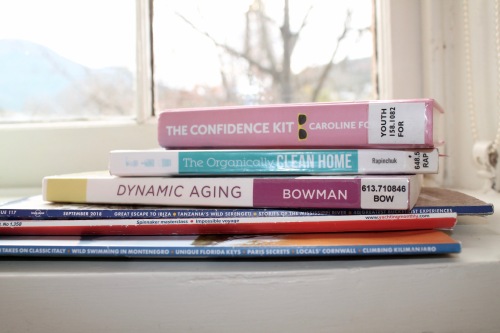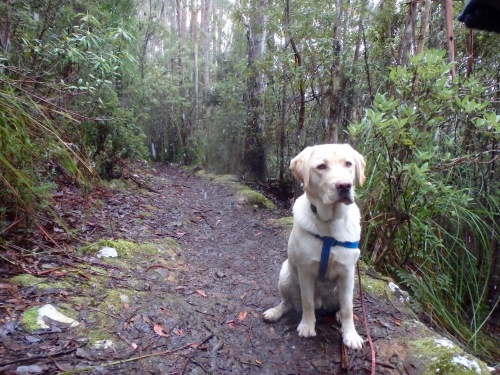visiting the library

I have to be in a certain mood to visit the library. I can go if I’m in a rush. Because I’m usually in a rush in town. But not if I’m in a hurry. Because when I’m hurrying, I never find what I’m looking for.
For years I’ve made time to visit the library, for two reasons. I go to borrow magazines which I leave on the kitchen table and bathroom windowsill for whomever is around, including myself, but especially for my daughter who claims she hates reading. But I also visit the library to borrow a certain kind of book that I read before bed, plus an audiobook for the car. Both of these feel kind of necessary.
Throughout my kids’ childhood, magazines and books from the library washed in and out of the house, like high and low tides. Now that they’ve left school, and one has left home, I still make near fortnightly trips to the library. I think I go because I never know what I’ll find there. How will I know what I am looking for, until I pick it up in the library? Rarely do I use the computer catalogue. Sometimes I’ll cheat and glance through the Reserved Books shelf, where more assiduous members get rewarded for alerting librarians to interesting new titles. Or I’ll look through the Recent Returns at the end of each bay. Or I might head straight to Psychology, Food or Travel, and see what jumps out at me.
Yesterday, after sliding a stack of returns one by one down the Returns chute, I passed through the automatic doors. A rush of overly warm air hit me, a combination of heating, computers and windows that never open. My first pick up, from a stand of new books by the doors, was a book with a bright pink cover and black shiny sunglasses, The Confidence Kit. My daughter is about to travel overseas, and I thought the book might help her with feeling fear and doing it anyway. Then I picked up a sailing magazine and a couple of travel magazines – for the same reason. The audio book I chose was Rejection Proof, by Jia Jiang, a story about a Chinese-American’s mission to score 100 rejections, with the aim of strengthening himself against his reluctance to ask for what he wanted – which I hoped might inure me to the rejections a current manuscript of mine was soon to receive.
Then I found a book by the blog superstar Clean Mama, about natural household cleaning recipes – a book I’d never buy but thought might be useful. ‘If you do nothing else in this book’, Becky Rapinchuck wrote, ‘scrub the sink with this paste after cleaning up the kitchen each night’. ‘Oh yeh’, I thought, and promptly decided to give it a go.
The last book I checked out was Dynamic Aging, a manual for stretching muscles in the second half of life to retain strength and balance, complete with unappealing line drawings and triple-spaced text. Written by a young American physio, it advocated increasing daily movement to 3 to 4 hours, which seemed to me almost messianic in its intent. Again, not a book I’d buy. But I thought it might help me think through what to do with my less than supple hips.
On the way home from the library, I bought washing soda and lemon essential oil, for Clean Mama’s sink scrub. I left the pink book about confidence on the windowsill in the bathroom. The magazines and cleaning book I left on the table in the kitchen.
That night, after cleaning up the kitchen, I tipped a cup of washing soda into a jar, added 30 drops of lemon essential oil, used a knife to mix the oil into the soda and found a second scrubbing brush. Then I sprinkled a quarter of a cup of the mix on to my sinks, added a squirt of dishwashing liquid, a small amount of water and set about scrubbing my sinks. The lemon oil wafted up as the sinks came clean, buffed with that day’s teatowel. Done. Clean Mama was right, the sinks looked great, and I knew I’d be glad of having done it the next morning. But every night, as Clean Mama suggested? Well, that was another thing.
After luring the dog into his crate, I went upstairs, where I lay on the carpet in the bathroom, too tired to go to bed. I picked up the exercise book lying on the windowsill. ‘I’ll just read the last chapter’, I told myself. And so on and so on until I’d read the whole book. Reading it made me realise that I’d swallowed the idea that ageing means a slow but ineluctable weakening of strength and wellbeing. Dynamic Aging suggested that there was another way. Not an easy way. Like all maintenance activities, it involved time and commitment. But perhaps, I thought, heading to bed – where I slept deeply – I would thank myself in years to come if I did what it takes to keep my core strong.
The Rejection Proof audio book, which I’d never have downloaded or bought, I played in the car the next day, driving my dog to the country kennels where he sometimes spends the day. It was fabulous. It changed my thinking about how I might respond to the rejections soon to come my way from a manuscript of mine. The fact that the author was Chinese American, also made a big impression. I was surprised, and embarrassed to be surprised, at his sophisticated command of both the English language (his second language) and his own experience.
It’s the serendipity of visiting the library that I like. I like going not knowing what I want to read. On passing through the automatic doors, I give myself over to another impulse. Curiosity, I suppose. I go to the library to find out more about what I need to find out about, without knowing before I get there what that might be. I got through menopause without visiting the doctor this way. I got through my kids’ adolescence without going mad this way. I get through my unconventional marriage this way. ‘Everything’, my naturopath once told me, before I entered menopause, ‘is normal’. The nice thing about the library is that everything is normal there too.

